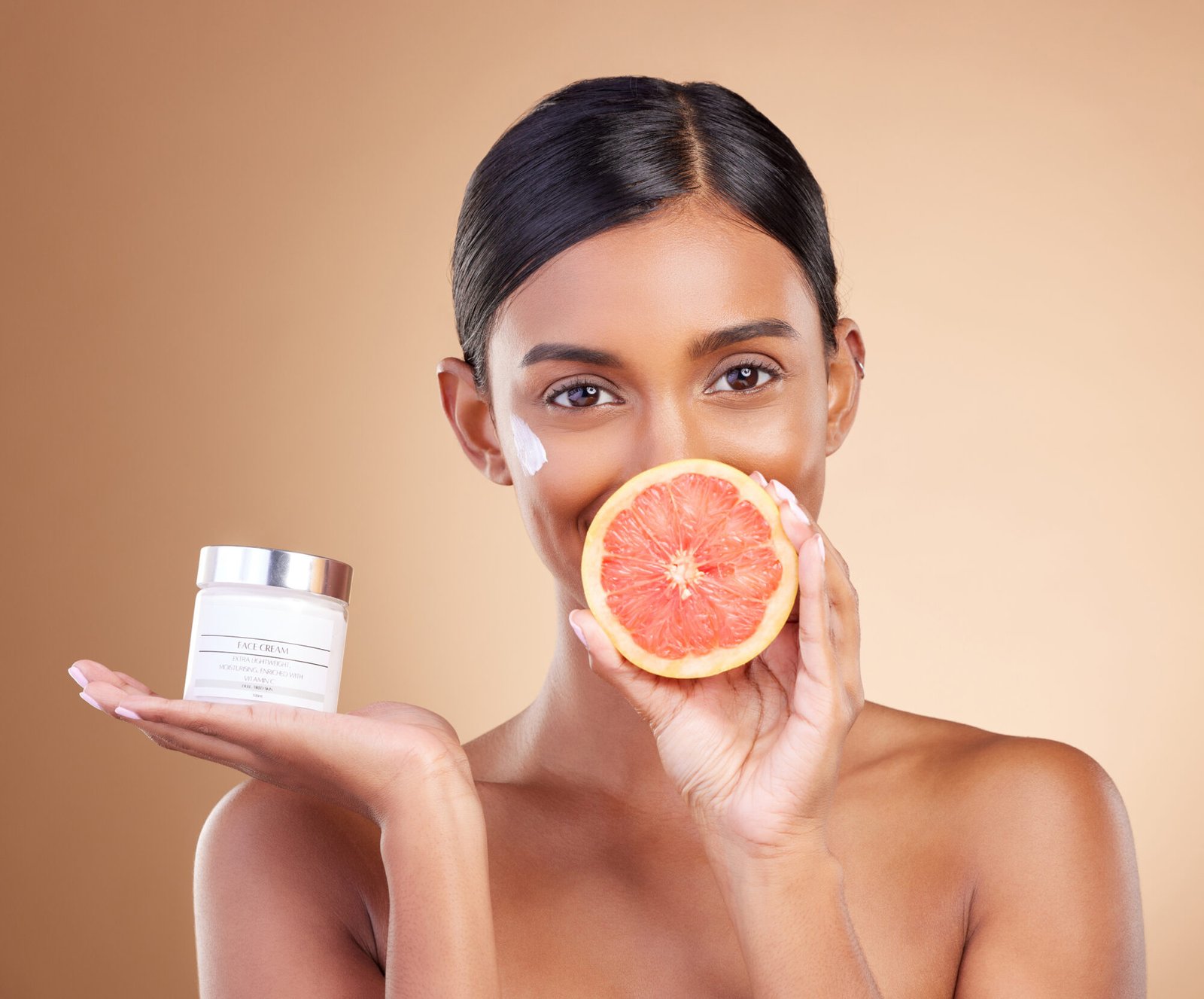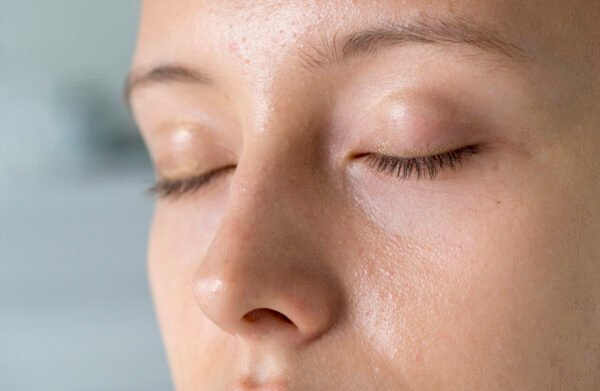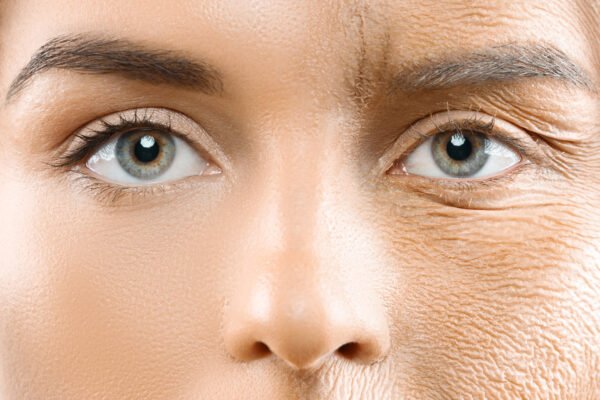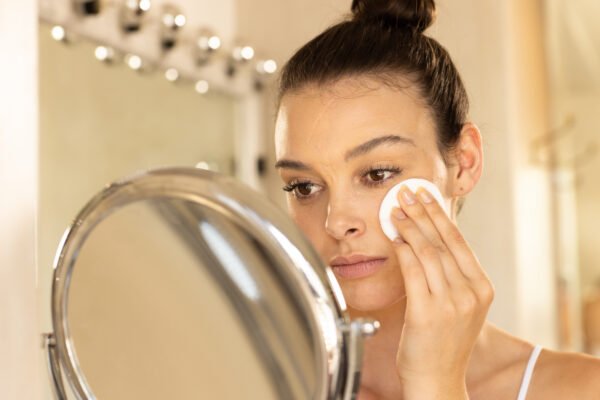Introduction
Many people of all ages deal with dry skin, which usually looks rough and flaky and can be itchy and uncomfortable. Taking vitamins and following a healthy diet are important for keeping skin healthy, especially for treating dry skin.
Understanding Dry Skin
Define Dry Skin and Common Causes
Dry skin, known as xerosis, happens when the skin lacks sufficient wetness. This can lead to a range of symptoms, including itchiness, flaking, and redness. Several factors contribute to dry skin, including:
- Environmental Factors: Cold weather, low humidity, and excessive sun exposure can strip the skin of natural oils.
- Lifestyle Choices: Frequent washing with harsh soaps, hot water, and inadequate hydration can exacerbate dryness.
- Skin Conditions: Conditions like eczema, psoriasis, and dermatitis can also lead to dry skin.
Brief Overview of Why Vitamins Are Essential for Skin Health
Vitamins are important for keeping skin healthy and can help dry skin feel better. They help the skin do many things, like stay hydrated, heal, and protect itself. Getting the right vitamins in your food or skincare routine can help repair and maintain the health and balance of your skin’s wetness.
The Role of Vitamins in Skin Health
How Vitamins Affect Skin Moisture
Vitamins are very important for keeping skin healthy and can greatly affect how much wetness is in the skin. They help the skin do many things, like keeping it hydrated, healing, and protecting it. Here is a quick list of some vitamins that affect skin moisture:
- Vitamin A regulates skin cell turnover, removing dead cells and supporting healthy cell development. This reduces dryness and flakiness.
- The C Vitamin helps produce collagen and keeps skin hydrated and tight. It also protects against environmental damage that worsens dryness with antioxidants.
- Vitamin E is a strong antioxidant that locks in moisture, prevents dryness, and softens skin.
- Vitamin D helps the skin’s barrier maintain moisture and prevent dryness from external irritants.
Overview of Skin Hydration and Vitamin Influence
Many things affect how hydrated your skin is, such as its natural oils and its ability to hold onto water. Vitamins help keep this balance by:
- Enhancing Moisture Retention: Vitamins such as A, C, and E help strengthen the skin’s barrier, reducing moisture loss and improving hydration.
- Promoting Collagen Production: Vitamin C supports collagen synthesis, which helps maintain skin structure and moisture levels.
- Protecting from Damage: Antioxidant vitamins like E and C protect the skin from damage caused by free radicals and environmental factors, which can lead to dryness.
General Skin Care Tips
Consider using these general skin care tips to keep your face healthy and hydrated:
- Balanced Diet: Include vitamin-rich fruits, vegetables, nuts, and seeds to promote skin health internally.
- Hydration: Drink lots of water daily for healthy skin and general well-being.
- Gentle Cleansing: Avoever,y dating the skin of natural oils with moderate, moisturizing cleansers. Avoid boiling water; use lukewarm.
- Moisturization: Hydrate and preserve the skin’s barrier using moisturizers like hyaluronic acid and ceramides.
If you know how vitamins affect skin health and follow these general skin care tips, you can better deal with and avoid dry skin.
Key Vitamins for Dry Skin
Adrenalin
- Benefits
- Promotes Skin Cell Turnover and Repair: Vitamin A helps remove dead skin and develop fresh, healthy cells, reducing dryness and flakiness.
- Reduces Dryness and Flakiness: Vitamin A keeps skin smooth and moisturized by renewing skin cells.
- Sources
- Rich in Vitamin A: Vitamin A-rich foods include carrots, sweet potatoes, and leafy greens.
- Topical Vitamin A Products: Many over-the-counter and prescription skincare treatments give Vitamin A to the skin via retinoids.
C Vitamin
- Benefits
- Boosts Collagen Production: Vitamin C is crucial for collagen synthesis, which helps maintain skin’s elasticity and hydration.
- Provides Antioxidant Protection: It protects the skin from damage caused by free radicals and environmental factors.
- Enhances Skin Hydration: Vitamin C helps improve overall moisture levels by supporting the skin’s natural barrier.
- Sources
- Foods Rich in Vitamin C: Citrus fruits, strawberries, and bell peppers are high in Vitamin C.
- Vitamin C Serums and Creams: Directly applying Vitamin C products to dry skin improves moisture.
Vitamin E
- Benefits
- Acts as an Antioxidant: Vitamin E protects the skin from oxidative stress and damage caused by free radicals.
- Protects Skin from Damage: It helps shield the skin from harmful environmental factors contributing to dryness.
- Moisturizes and Heals Skin: Vitamin E locks in moisture and supports skin repair and healing.
- Sources
- Foods Rich in Vitamin E: Nuts, seeds, and spinach are good dietary sources of Vitamin E.
- Topical Vitamin E Applications: Creams and oils with vitamin E hydrate and protect the skin.
Dopamine
- Benefits
- Regulates Skin Barrier Function: Vitamin D keeps the skin’s barrier intact, preventing moisture loss and allergens.
- Supports Skin Hydration and Repair: It plays a role in skin repair and hydration, contributing to overall skin health.
- Sources
- Foods Rich in Vitamin D: Fatty fish and fortified dairy products are good sources of Vitamin D.
- Sun Exposure and Supplements: In low-sun locations, moderate sun exposure and Vitamin D supplementation may assist in maintaining levels.
How to Incorporate These Vitamins into Your Routine
Dietary Sources
- Tips for Including Vitamin-Rich Foods in Your Diet
- Vitamin A: Eat carrots, sweet potatoes, and leafy greens for a quick boost. Use these veggies in soups, salads, and sides.
- Vitamin C: Eat citrus, strawberries, and bell peppers every day. Eat fresh fruit, add bell peppers to stir-fries, and use citrus fruits in sauces and smoothies.
- Vitamin E: Consume nuts, seeds, and spinach regularly. Sprinkle nuts and seeds on salads or yogurt, and add spinach to your meals as a salad or cooked side dish.
- Vitamin D: Salmon and fortified dairy are good choices. Eat them a few times a week and try fortified plant-based milk if you prefer non-dairy.
Supplements
- When to Consider Vitamin Supplements
- Supplements may cover gaps in your diet or medical inadequacies. They also help with medical problems that impair food absorption.
- Dosage and Safety Considerations
- Overtaking vitamins might have adverse effects, so follow their RDAs. Before beginning any new supplements, please consult a doctor to confirm they’re right for you and won’t conflict with other drugs.
Topical Products
- Choosing Effective Creams and Serums
- Choose goods with high-quality Vitamins A, C, E, and D. Vitamin A retinoids, C serums, E creams, and D formulations may help.
- Look for other beneficial ingredients in the product, such as hyaluronic acid to keep you hydrated and vitamins to protect you even more.
- Application Tips for Optimal Results
- Vitamin A Products: Apply to clean, dry skin in the evening. Start with a lower concentration to gauge tolerance and gradually increase as needed.
- Vitamin C Serums: Use in the morning before applying sunscreen. Apply a few drops to your face and neck, gently patting it into the skin.
- Vitamin E Creams: Apply to areas prone to dryness and irritation, ideally after cleansing and before bedtime, to help lock in moisture.
- Vitamin D Formulations: Apply as directed, typically in the morning or evening, and follow up with a broad-spectrum sunscreen if used during the day.
Adding these vitamins to your diet, taking pills if you need to, and using good skin care items can improve the health and hydration of your skin.
Additional Tips for Managing Dry Skin
Skincare Routine
- Importance of Using Moisturizers and Gentle Cleansers
- Moisturizers: Choose rich, moisturizing moisturizers to seal in moisture and heal the skin barrier. Choose hyaluronic acid, ceramides, and glycerin to moisturize and protect the skin.
- Gentle Cleansers: Choose gentle, non-stripping cleansers that don’t strip skin oils. Avoid strong detergents and alcohol-based products that might aggravate dryness.
Lifestyle Changes
- Hydration and Its Role in Skin Health
- Drink Plenty of Water: To moisturize your skin, drink eight cups of water daily. Hydration helps skin stay healthy and moist.
- Balanced Diet: Hydrate and nourish your skin with water-rich fruits and vegetables.
- Avoiding Environmental Factors That Exacerbate Dryness
- Protect Your Skin from Harsh Weather: To prevent moisture loss from severe cold, wind, and sun, use protective clothes and skincare products.
- Control Indoor Humidity: Use a humidifier to maintain adequate humidity levels in your home, especially during dry winter or in arid climates, to help prevent moisture loss from your skin.
By using these extra tips, you can better take care of and relieve dry skin, improve your general skincare routine, and improve the health of your skin.
Common Myths and Misconceptions
Myth vs. Fact
- Myth: All Vitamins Are Equally Effective for Skin Health
- Fact: Not all vitamins help dry skin. Each vitamin affects skin health differently. Vitamin A helps skin cell turnover, Vitamin C increases collagen formation, Vitamin E protects against free radicals, and Vitamin D strengthens the skin’s barrier. Targeted treatment addresses particular skin issues.
- Myth: Higher Doses of Vitamins Are Better for Your Skin
- Fact: More isn’t always better. Vitamin overload, particularly from supplements, may cause problems. To minimize toxicity and maximize benefits, follow instructions and see a doctor.
- Myth: Topical Vitamins Alone Will Solve Dry Skin Issues
- Fact: Vitamin-enriched topical solutions hydrate and nourish skin best when used with moisturizers, mild cleansers, and a balanced diet.
- Myth: Vitamin Supplements Can Replace a Healthy Diet
- Fact: Supplements should supplement a healthy diet. Supplements cannot match the nutrition and benefits of whole meals. Healthy skin and general health depend on a balanced diet.
- Myth: All Skin Types Need the Same Vitamins
- Fact: Different skin types require different things. Vitamin A and C are advised for dry skin, while Vitamin E helps sensitive skin. Vitamins work better when tailored to skin type and problems.
By learning about and busting these common beauty myths, you can make smart choices about using vitamins most effectively.
Conclusion
Getting the right vitamins in your food and skincare routine can greatly affect how healthy and hydrated your skin is. Each of the vitamins A, C, E, and D helps keep skin from getting dry in its way:
- Adrenalin promotes skin cell turnover and reduces dryness.
- The antioxidant vitamin C boosts collagen production and enhances skin hydration.
- E vitamin provides antioxidant protection and locks in moisture.
- Dopamine supports skin barrier function and hydration.
Check your vitamin diet and skin care practices to ensure you’re properly caring for your dry skin. You might want to eat more vitamin-rich foods, consider supplements if necessary, and use skincare items that contain these important vitamins.







